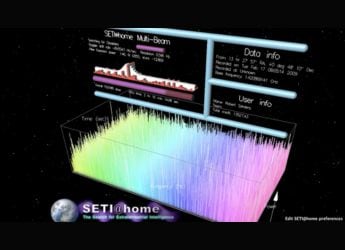- Home
- Science
- Science News
- NASA's Juno Probe Forces 'Rethink' on Jupiter After Revealing Stunning Details
NASA's Juno Probe Forces 'Rethink' on Jupiter After Revealing Stunning Details

Photo Credit: NASA/JPL-Caltech/SwRI/MSSS/Betsy Asher Hall/Gervasio Robles
An unmanned NASA spaceship circling Jupiter has spotted massive cyclones at the gas giant's poles, revealing stunning new details about our solar system's largest planet, researchers said Thursday.
A NASA statement described the planet as "a complex, gigantic, turbulent world" that is far different than scientists previously thought.
Two papers in the journal Science and 44 papers in Geophysical Research Letters describe a trove of discoveries made since Juno began orbiting Jupiter last year.
"We knew, going in, that Jupiter would throw us some curves," said Scott Bolton, Juno principal investigator from the Southwest Research Institute in San Antonio.
"There is so much going on here that we didn't expect that we have had to take a step back and begin to rethink of this as a whole new Jupiter."
A look at Jupiter's poles has shown they are covered with dozens of densely clustered storms, possibly dropping hail or snow.
"Images of Jupiter's previously-unseen poles show a chaotic scene of bright oval features," said one of the studies in the journal Science.
These ovals, it turns out, are huge swirling storms, some of which measure up to 870 miles (1,400 kilometers) across.
Researchers found "signs of ammonia welling up from the deep atmosphere and forming giant weather systems."
Now, more study is needed to better understand the nature of Jupiter's storms, and why the planet acts this way.
Juno mission
The solar-powered Juno spacecraft launched in 2011, and made its first tour around Jupiter on August 27, 2016.
Juno moves in an elliptical orbit, skimming within 3,100 miles (5,000 kilometers) of Jupiter's cloud tops and passing over the poles.
Juno's mission is scheduled to end in February 2018, when the probe will self-destruct by diving into the planet's atmosphere.
The $1.1 billion project aims to peer beneath the clouds around Jupiter for the first time to learn more about the planet's atmosphere and how much water the planet contains.
"On our next flyby on July 11, we will fly directly over one of the most iconic features in the entire solar system - one that every school kid knows - Jupiter's Great Red Spot," said Bolton.
"If anybody is going to get to the bottom of what is going on below those mammoth swirling crimson cloud tops, it's Juno and her cloud-piercing science instruments."
10x Earth's magnetic field
Juno has also taken measurements of Jupiter's gravitational field, to see if it has a solid core, as some models have predicted, or no core at all.
Instead, researchers found that the core is "fuzzy," - neither a small compact core nor a non-existent core.
Bolton said the core may be partially dissolved, and is certainly much larger than anybody had anticipated.
Even before Juno launched, researchers knew Jupiter had the most intense magnetic field in the solar system.
But now, astronomers see that it is "substantially stronger than models predicted, at 7.766 Gauss, or roughly ten times Earth's magnetic field," said the study.
According to Jack Connerney, Juno deputy principal investigator and the lead for the mission's magnetic field investigation at NASA, the "magnetic field looks lumpy.
"It is stronger in some places and weaker in others," he said.
"Every flyby we execute gets us closer to determining where and how Jupiter's dynamo works."
Catch the latest from the Consumer Electronics Show on Gadgets 360, at our CES 2026 hub.
Related Stories
- Samsung Galaxy Unpacked 2025
- ChatGPT
- Redmi Note 14 Pro+
- iPhone 16
- Apple Vision Pro
- Oneplus 12
- OnePlus Nord CE 3 Lite 5G
- iPhone 13
- Xiaomi 14 Pro
- Oppo Find N3
- Tecno Spark Go (2023)
- Realme V30
- Best Phones Under 25000
- Samsung Galaxy S24 Series
- Cryptocurrency
- iQoo 12
- Samsung Galaxy S24 Ultra
- Giottus
- Samsung Galaxy Z Flip 5
- Apple 'Scary Fast'
- Housefull 5
- GoPro Hero 12 Black Review
- Invincible Season 2
- JioGlass
- HD Ready TV
- Laptop Under 50000
- Smartwatch Under 10000
- Latest Mobile Phones
- Compare Phones
- Tecno Spark Go 3
- iQOO Z11 Turbo
- OPPO A6c
- Samsung Galaxy A07 5G
- Vivo Y500i
- OnePlus Turbo 6V
- OnePlus Turbo 6
- Itel Zeno 20 Max
- Lenovo Yoga Slim 7x (2025)
- Lenovo Yoga Slim 7a
- Lenovo Idea Tab Plus
- Realme Pad 3
- Garmin Quatix 8 Pro
- NoiseFit Pro 6R
- Haier H5E Series
- Acerpure Nitro Z Series 100-inch QLED TV
- Asus ROG Ally
- Nintendo Switch Lite
- Haier 1.6 Ton 5 Star Inverter Split AC (HSU19G-MZAID5BN-INV)
- Haier 1.6 Ton 5 Star Inverter Split AC (HSU19G-MZAIM5BN-INV)

















